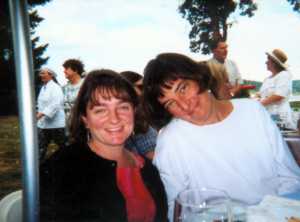Article by Lynda La Rocca
Writing – April 2005 – Colorado Central Magazine
“Writers have an island, a center of refuge, within themselves. It is the mind’s anchorage, the soul’s Great Good Place.” –Wright Morris, American novelist
WRITING AS A MEANS of spiritual unfolding has a long tradition in cultures the world over. It’s a tradition being upheld in Central Colorado today by sisters-in-law Amy Frykholm and Stephanie Frykholm.
Amy and Stephanie facilitate overnight retreats on “Writing and Spirituality,” along with shorter workshops on issues–like the dreaded “writer’s block”–that occasionally befuddle even the most prolific scribes and scribblers.
This energetic duo sees writing as a path to self-discovery. They design their programs using specific exercises and strategies, often of their own invention, that promote greater spiritual understanding and enhance productivity.
“These workshops are about empowerment,” says Stephanie, a certified doula who assists pregnant women and their families through childbirth and the postpartum period. She’s also a writer and reiki master and lives in Alamosa with her husband and three children. “We approach writing with a spiritual and philosophical grounding that would also apply to how you live your life. We want to ignite a person’s celebration of who they are.”
“Writing is a process that helps you better understand both yourself and the sacred,” adds Amy, who lives in Leadville with her husband and son, teaches literature and religion at Colorado Mountain College’s Timberline campus, and is the author of Rapture Culture: Left Behind in Evangelical America (Oxford University Press, 2004). “We take people through the process of using writing to go where they need to go.”
And just where that is depends on each participant. For some, it means finding a way to overcome the inertia or resistance interfering with the completion of that next article or book chapter. For others, it involves giving themselves permission to write, for perhaps the first time, and discovering that their stories, too, have merit.
“I believe deeply in the power of telling our stories,” Stephanie declares. “This is so essential to a person’s sense of worth.”
Toward that end, their retreats and workshops draw on the philosophy of writer Natalie Goldberg, who emphasizes trusting one’s own mind, and writing without letting judgment or presupposition cloud the act of physically putting words on paper.
“You set a time limit, keep your hand moving, don’t cross anything out, and just write your gut response [to a prompt or subject introduced by the facilitators],” explains Amy, who employs the technique in her own writing.
“This type of writing practice promotes detachment from self-judgment, from what we think we should write or how we think we should live, while allowing each person to discover the richness and fullness of the present moment,” says Stephanie. “And that’s something that can benefit all writers, at all levels of the profession.”
BECAUSE THEIR PROGRAMS emphasize the contemplative aspects of writing, there is little of the catharsis or intense emotional release that seems to be the almost-inevitable climax of some writing workshops.
“We’re aiming for arriving in that meditative place,” Amy notes. “And from there, you [the participant] are invited to continue to whatever level is meaningful to you.”
To help alleviate the anxieties, fears, and inhibitions that often surround writing, Stephanie and Amy’s presentations include activities that encompass all of the senses and reawaken a spirit of playfulness. These can be anything from stretching and dance movements to listening to music, skipping stones across a river’s surface, inhaling the scent of sagebrush or fresh flowers, even silently observing a candle’s flickering flame.
“We want to engage as much of the whole person as possible,” explains Stephanie. “So our exercises are designed to focus on each of the senses, along with the heart and the mind, the intellect and the spirit.”
At a recent workshop, writers experienced the creative process as visual artists through an exercise that involved giving physical form to their writer’s block. After heaping a plethora of arts-and-crafts materials on several tables, Stephanie and Amy gleefully joined the group in fashioning writer’s blocks using sparkly glitter, colored pipe cleaners, neon-hued clay, crepe paper, wire, aluminum foil, metal screws and washers, toothpicks, yarn, fabric, tiny wooden cutouts of hearts, moons and stars, even discarded toilet-paper tubes.

These whimsical creations came alive as each participant infused his or her block with its own personality, named it, and engaged in a written dialogue with it, describing their block’s behavior, observing its patterns, and taking note of the feelings generated during its creation.
“The idea is to turn our writer’s blocks into friends, not to fear them, but rather to let them teach us,” Amy explains.
Afterward, the group displayed their blocks with the pride of new parents, shared insights into why each block manifested itself in a particular way, and read aloud from their dialogues.
“Blocks governing how we write may reflect other areas of our lives, like how we deal with conflicts, priorities, and responsibilities,” observes Stephanie.
“Yet writer’s block can be a gift, because resistance is itself a gift,” adds Amy. “When we embrace what is difficult–like a writer’s block that scares us–and we’re ready to do the digging, we end up finding treasure.”
Handouts summarizing workshop exercises and containing quotes from well-known authors serve as reminders that virtually all writers experience moments when their muse seems to have vanished, and that writing, like life, demands a willingness not only to learn from others, but to listen to our own inner voices and continue developing our skills, despite circumstances or outside influences.
This is essential because, as Amy succinctly puts it, “The point of life is not to master, but to practice.” And that is equally true of writing–or of any endeavor that ignites our creative fires.
Lynda La Rocca writes from Twin Lakes for many publications which pay better than Colorado Central.

